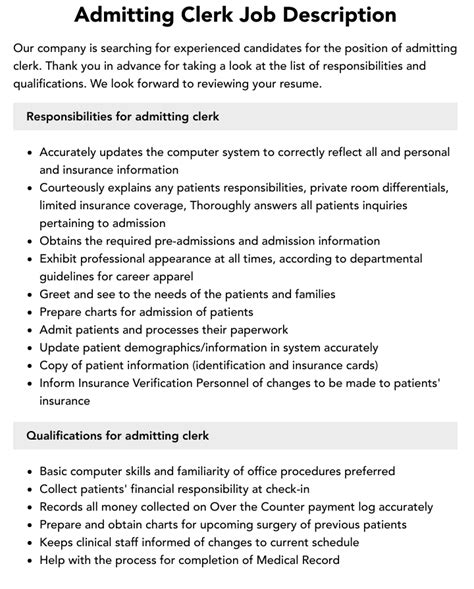Intro
Discover 7 in-demand hospital front desk jobs, from administrative assistants to registration clerks. Learn about the roles, responsibilities, and required skills for each position. Kickstart your healthcare career in a dynamic front-desk environment, with opportunities for growth and development in patient registration, medical records, and more.
Working in a hospital setting can be a rewarding and challenging career path, especially when it comes to hospital front desk jobs. These roles are often the first point of contact for patients, families, and healthcare professionals, requiring a unique blend of administrative, communication, and interpersonal skills. In this article, we will explore seven hospital front desk jobs to consider, highlighting their responsibilities, requirements, and growth opportunities.

1. Hospital Receptionist
Hospital receptionists are the face of the hospital, greeting patients, families, and visitors, while also managing administrative tasks such as answering phone calls, scheduling appointments, and handling correspondence. They must possess excellent communication and interpersonal skills, as well as basic computer knowledge.
Responsibilities:
- Greet patients and families, providing directions and information
- Answer phone calls, take messages, and respond to inquiries
- Schedule appointments and manage calendars
- Maintain accurate records and files
- Provide general administrative support
Requirements:
- High school diploma or equivalent
- Basic computer skills and knowledge of software applications
- Excellent communication and interpersonal skills
- Ability to work in a fast-paced environment
2. Patient Access Representative
Patient access representatives are responsible for ensuring that patients have a smooth and efficient experience, from registration to discharge. They verify patient information, manage insurance and billing, and coordinate with healthcare teams to ensure seamless care.
Responsibilities:
- Verify patient demographics and insurance information
- Manage patient registration and admission processes
- Coordinate with healthcare teams to ensure smooth transitions
- Handle billing and insurance-related inquiries
- Maintain accurate records and files
Requirements:
- High school diploma or equivalent
- Basic computer skills and knowledge of software applications
- Excellent communication and interpersonal skills
- Ability to work in a fast-paced environment

3. Medical Secretary
Medical secretaries provide administrative support to healthcare professionals, including physicians, nurses, and other medical staff. They manage schedules, coordinate appointments, and handle correspondence, as well as maintain accurate records and files.
Responsibilities:
- Manage schedules and coordinate appointments
- Handle correspondence and phone calls
- Maintain accurate records and files
- Provide general administrative support
- Assist with medical transcription and coding
Requirements:
- Post-secondary education or training in medical administration
- Basic computer skills and knowledge of software applications
- Excellent communication and interpersonal skills
- Ability to maintain confidentiality and handle sensitive information
4. Admitting Clerk
Admitting clerks are responsible for ensuring that patients are properly admitted to the hospital, including verifying patient information, managing insurance and billing, and coordinating with healthcare teams.
Responsibilities:
- Verify patient demographics and insurance information
- Manage patient admission processes
- Coordinate with healthcare teams to ensure smooth transitions
- Handle billing and insurance-related inquiries
- Maintain accurate records and files
Requirements:
- High school diploma or equivalent
- Basic computer skills and knowledge of software applications
- Excellent communication and interpersonal skills
- Ability to work in a fast-paced environment

5. Registration Clerk
Registration clerks are responsible for registering patients and managing patient information, including demographics, insurance, and billing. They must possess excellent communication and interpersonal skills, as well as basic computer knowledge.
Responsibilities:
- Register patients and manage patient information
- Verify patient demographics and insurance information
- Manage patient billing and insurance-related inquiries
- Maintain accurate records and files
- Provide general administrative support
Requirements:
- High school diploma or equivalent
- Basic computer skills and knowledge of software applications
- Excellent communication and interpersonal skills
- Ability to work in a fast-paced environment
6. Scheduling Coordinator
Scheduling coordinators are responsible for managing patient schedules, including coordinating appointments, procedures, and surgeries. They must possess excellent communication and interpersonal skills, as well as basic computer knowledge.
Responsibilities:
- Coordinate patient schedules and appointments
- Manage calendars and schedules
- Communicate with patients and healthcare teams
- Maintain accurate records and files
- Provide general administrative support
Requirements:
- High school diploma or equivalent
- Basic computer skills and knowledge of software applications
- Excellent communication and interpersonal skills
- Ability to work in a fast-paced environment

7. Patient Advocate
Patient advocates are responsible for ensuring that patients receive high-quality care and support, including navigating the healthcare system, managing complaints, and providing emotional support.
Responsibilities:
- Advocate for patients and families
- Navigate the healthcare system to ensure seamless care
- Manage complaints and concerns
- Provide emotional support and counseling
- Maintain accurate records and files
Requirements:
- Post-secondary education or training in patient advocacy or a related field
- Excellent communication and interpersonal skills
- Ability to work in a fast-paced environment
- Knowledge of healthcare policies and procedures
In conclusion, hospital front desk jobs offer a range of opportunities for individuals looking to start or advance their careers in healthcare administration. From hospital receptionists to patient advocates, these roles require a unique blend of administrative, communication, and interpersonal skills. By understanding the responsibilities, requirements, and growth opportunities associated with these jobs, individuals can make informed decisions about their career paths and pursue rewarding and challenging roles in hospital front desk jobs.
What is the average salary for hospital front desk jobs?
+The average salary for hospital front desk jobs varies depending on the specific role, location, and employer. However, according to the Bureau of Labor Statistics, the median annual salary for medical receptionists is around $34,000, while patient access representatives can earn up to $45,000 per year.
What are the most important skills for hospital front desk jobs?
+Excellent communication and interpersonal skills are essential for hospital front desk jobs, as well as basic computer knowledge and attention to detail. Additionally, the ability to work in a fast-paced environment and maintain confidentiality is critical.
How can I advance my career in hospital front desk jobs?
+To advance your career in hospital front desk jobs, consider pursuing post-secondary education or training in healthcare administration or a related field. Additionally, gaining experience in different roles and developing specialized skills, such as medical coding or billing, can increase your job prospects and earning potential.
